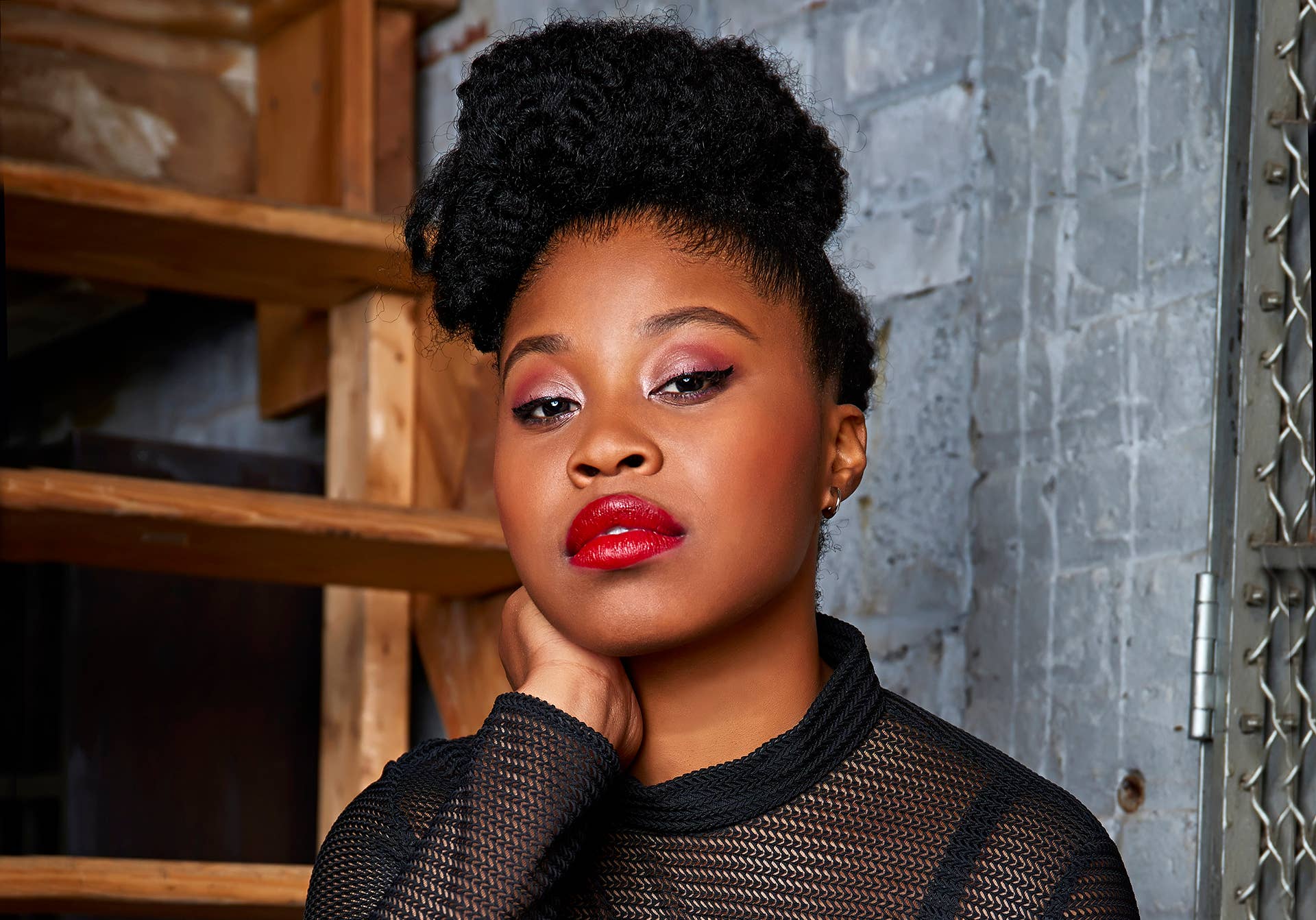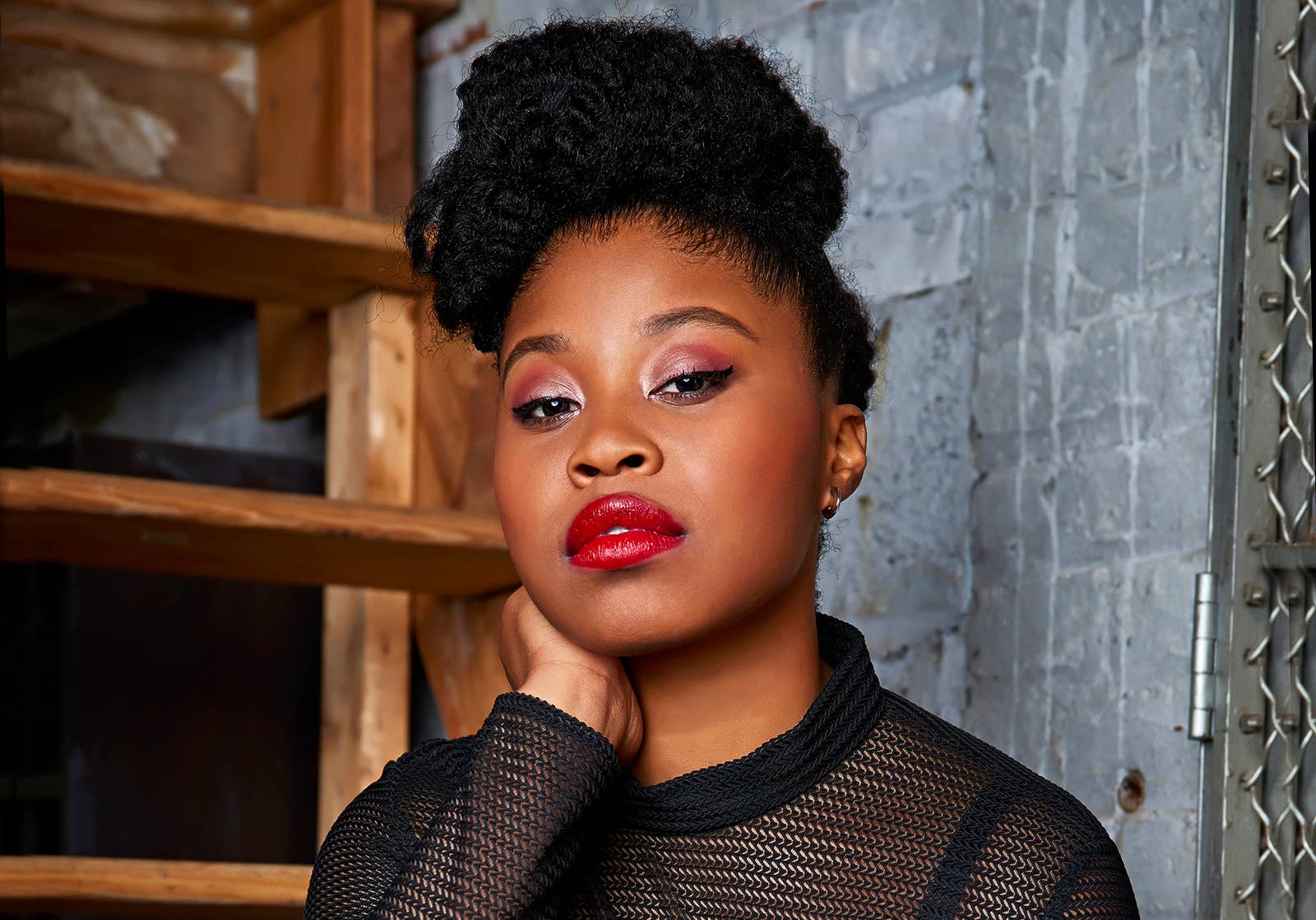
Going into Shaka King’s Judas and the Black Messiah, all I knew was that the film depicted Fred Hampton’s murder, and how William O’Neal’s deception played a part in that. I knew that Daniel Kaluuya and LaKeith Stanfield were playing Hampton and O’Neal, respectively… and that was about it. Part of it was that, at the time (late December 2020, no flex), there was a purposeful hold on new information regarding this film. I didn’t realize that Young Black Hollywood was all over this film. I certainly wasn’t ready for the smile that adorned my face when Dominique Fishback was cast as Deborah Johnson, Chairman Fred’s girlfriend and the mother of his son, Chairman Fred Hampton Jr.
You see, the 29-year-old Brooklyn-reppin’ actress/playwright has been working working in the industry since 2013. Many may remember her from 2015’s Show Me a Hero, or her work as Darlene in HBO’s The Deuce. Her work as Angel in Jordana Spiro’s 2018 directorial debut Night Comes On garnered praise from the film lovers, and since then, Fishback has racked up some strong appearances, including 2018’s The Hate U Give, 2020’s Project Power, a Netflix Original where she shared the screen with Jamie Foxx and Joseph Gordon-Levitt. “I’ve been acting since I was 15,” Fishback explains to Complex when asked if it feels like these moves have been happening quickly, “and doing theater all over the world really, and all over New York, and really not understanding how to get here, but just taking every single step. It feels new to some people when they’re like, ‘Oh, I only ever saw you in Project Power,’ and I’m like, ‘Oh, I did The Deuce.’ That was also something. It’s kind of interesting. It’s all about perception.”
One person who was paying attention was Judas director Shaka King, who was working on this film at the same time Fishback was doing some “research” of her own. “I was reading a book called A Taste of Power by Elaine Brown, who was a Panther,” Fishback remembers. “I’m a romantic, and I wanted to write my own Romeo and Juliet version of the Black Panther Party. Lo and behold, King was working on Judas and the Black Messiah; he had seen me in Show Me a Hero, which was technically the first big TV thing that I got to do with David Simon and HBO. I get an email that King is doing this movie and he wants me to play Deborah Johnson, and that he wants to meet with me. We met in a cafe in Brooklyn. It was interesting because he was saying the role was mine, and I’m like, ‘Is it mine, mine, or do you have to talk to somebody? I’m not trying to get too hyped. You’re really just going to give it to me?’ He was like, ‘It’s yours.’”
“Daniel and LaKeith were already attached and he was trying to get Jesse Plemons,” Fishback continues. “I was just like, ‘That’s a dope cast, I would love to be a part of that.’ He said, ‘Take the script and let me know what you think.’ I took the script and I read it, and I gave him a whole long email about all of the things that I loved. And I said, ‘I have two notes, but I don’t want to overstep. So if you want to hear them, let me know. And if you don’t, it’s fine.’ He was like, ‘Well, you’ll be playing her, you can’t overstep. So give me your notes.’”
Projects like these are delicate. As an actor in a feature like Judas, you not only have to nail the historical aspect of the story, but you’re also playing a real person. Doing right by Deborah Johnson was a top priority for Dominique. “I’m the sole advocate for this woman who is still alive. I’m the sole advocate of the love story. I’m the sole advocate of the mother voice in this film. So just that he was receptive to hear my thoughts was really exciting, and it made me just feel even more comfortable to even start this process of talking until we got to meet the family.” King was two steps ahead of Fishback, informing her that they were already working on connecting with the family. Everyone from King to various representatives of the film met with Chairman Fred Hampton Jr. and Deborah Johnson (who is now known as Akua Njeri).
“We ended up going to Chicago and talking with them around a table for seven hours. Chairman Fred Jr. went around the table and said, ‘I want to know why every single one of y’all want to do this movie.’ Everybody had to go around and tell our story as to why we wanted to be a part of this film. After that, Mama Akua wanted to sit with Daniel and I, and she asked us our approach as artists and all these things. I [said], ‘I just pray to a vessel for your spirit to move through me.’ She’s like, ‘Well, what if my spirit don’t mess with your spirit?’ Anytime Daniel would talk, she would be like, ‘Ooh, he’s speaking my language. I like him.’ I understood that Chairman Fred Jr. had to size Daniel up a bit; I guess Mama Akua had to size me up a bit. At the end I gave her a hug and I said, ‘Well, I hope you know my heart.’ She said, ‘I do. I just had to give you a hard time.’”
In becoming Deborah, Fishback says she not only created a Nina Simone-heavy playlist for Deborah, but she kept a journal as her character. “I made poems for every scene that she was in,” Fishback shares, “and the poem that she recites to Fred is actually a poem that Shaka allowed me to write. That was one of the notes that I had offered to him in the beginning. He was like, ‘Do you want to take a shot at that poem?’ I ended up writing a poem in the movie, which is amazing.” She shared the emotional piece on Instagram earlier this year, garnering much deserved praise. Fishback also says she didn’t expect King to let her use an original poem in the film. “I think [it’s] just a testament of Shaka because in knowing that it is a boy’s club, and to acknowledge that there’s a voice that he might not have access to as a man, and to say, ‘OK, let’s see, take a shot at it.’”
Fishback’s second note was to make sure that the romance and love between Deborah and Fred felt real. “When it comes to romance genres or this medium for Black women, a lot of times, they show us that we have to stand by a man to be proven worthy for him to love us or commit himself to us. We watch all of these romances like The Notebook, and Noah saw Allie in one minute and was like, ‘I love her.’ I loved that movie so much, it’s one of my favorites. I’m wondering why we don’t get that as Black women? It’s like, ‘Oh, ride out with him through jail, ride out through this, ride out through that.’ I didn’t want it to come off that she had gotten pregnant, and that was the reason why he was sticking with her. I wanted us to know that he already loved her, that he loved her for her intellect and who she was as a person.”
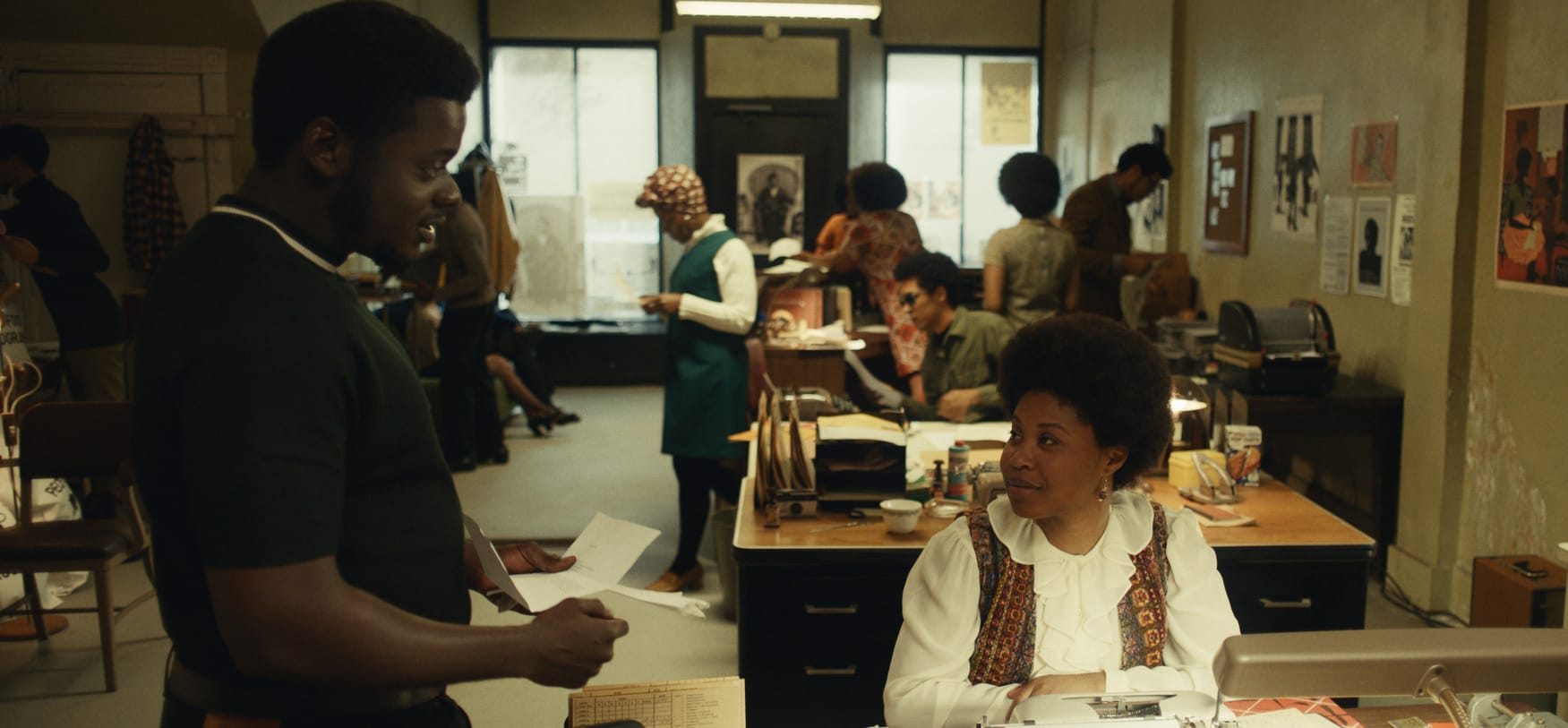
Hampton also loved his people, and a film about his life’s work is necessary for the times we’re living right now. “I think it was personified or materialized last summer when everybody came together and we were marching for George Floyd, Breonna Taylor, and Ahmaud Arbery,” Fishback says. “People of all races and backgrounds and ages and sex, we’re coming together to march under one cause. As we see in the movie, at 21 years old, Chairman Fred thought that a Rainbow Coalition was important, that it was an idea for oppressed people of all races and cultural backgrounds. It wasn’t just, he was doing The Black Panther Party mission and also the Rainbow Coalition mission; [it] was to put us all together under one umbrella of oppression to fight against the oppressors. That’s exactly what we got to do this past summer. It’s definitely not done. There’s definitely a lot more work that needs to be done, but that’s his legacy in things that we don’t know.”
With Kaluuya getting a Best Supporting Actor nomination at the Golden Globes for his portrayal of Chairman Fred in Judas, it would appear that Hampton’s life could get recognition from a number of awards organizations. That isn’t lost on Fishback, who admits that she keeps up with the conversations. She might not have any choice. “People always send it. I try not to get so engrossed in it, because we’ve seen many a situation where somebody is looked over. You never know. I’m excited, but if I get wrapped up in the predictions and then it doesn’t [get any nominations], is that going to disappoint me? I don’t want to feel disappointed, because the movie is so much more than that.”
It doesn’t help that Jamie Foxx has already predicted that Fishback would be thanking the Academy some day. “He kept saying that any chance he got, which really moved me,” Fishback confesses. “I had to, at that moment, take time to say, ‘OK, Dom, pause. You’ve been working for this your whole life. And this Academy Award-winning actor that you’ve been watching your whole life is saying these things, don’t just knock it off to say it doesn’t matter. Sit with it, and each moment, be present.’ So I’m trying to do it in a balanced way where I remain present.” Fishback also knows that AWARDS SZN recognition would work on a different level. “If I get nominated during this time, it would be for portraying such a deep love, a sacrificial gesture for somebody to do. When I think about the last scene with her, I think about the moms who have lost children to police brutality. I think about our ancestors. To do it for this role would be phenomenal. It would be a gift.”
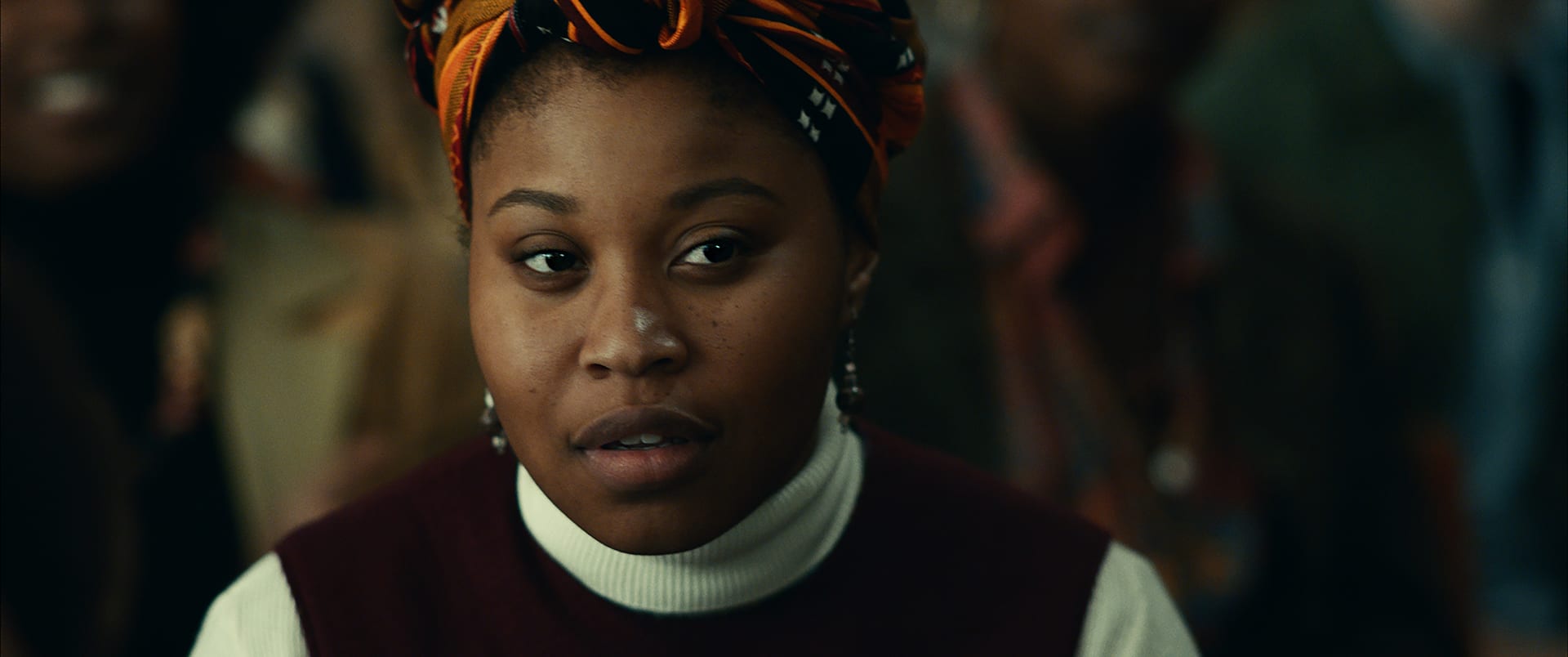
Projects like these are delicate. As an actor in a feature like Judas, you not only have to nail the historical aspect of the story, but you’re also playing a real person. Doing right by Deborah Johnson was a top priority for Dominique. “I’m the sole advocate for this woman who is still alive. I’m the sole advocate of the love story. I’m the sole advocate of the mother voice in this film. So just that he was receptive to hear my thoughts was really exciting, and it made me just feel even more comfortable to even start this process of talking until we got to meet the family.” King was two steps ahead of Fishback, informing her that they were already working on connecting with the family. Everyone from King to various representatives of the film met with Chairman Fred Hampton Jr. and Deborah Johnson (who is now known as Akua Njeri).
“We ended up going to Chicago and talking with them around a table for seven hours. Chairman Fred Jr. went around the table and said, ‘I want to know why every single one of y’all want to do this movie.’ Everybody had to go around and tell our story as to why we wanted to be a part of this film. After that, Mama Akua wanted to sit with Daniel and I, and she asked us our approach as artists and all these things. I [said], ‘I just pray to a vessel for your spirit to move through me.’ She’s like, ‘Well, what if my spirit don’t mess with your spirit?’ Anytime Daniel would talk, she would be like, ‘Ooh, he’s speaking my language. I like him.’ I understood that Chairman Fred Jr. had to size Daniel up a bit; I guess Mama Akua had to size me up a bit. At the end I gave her a hug and I said, ‘Well, I hope you know my heart.’ She said, ‘I do. I just had to give you a hard time.’”
In becoming Deborah, Fishback says she not only created a Nina Simone-heavy playlist for Deborah, but she kept a journal as her character. “I made poems for every scene that she was in,” Fishback shares, “and the poem that she recites to Fred is actually a poem that Shaka allowed me to write. That was one of the notes that I had offered to him in the beginning. He was like, ‘Do you want to take a shot at that poem?’ I ended up writing a poem in the movie, which is amazing.” She shared the emotional piece on Instagram earlier this year, garnering much deserved praise. Fishback also says she didn’t expect King to let her use an original poem in the film. “I think [it’s] just a testament of Shaka because in knowing that it is a boy’s club, and to acknowledge that there’s a voice that he might not have access to as a man, and to say, ‘OK, let’s see, take a shot at it.’”
Fishback’s second note was to make sure that the romance and love between Deborah and Fred felt real. “When it comes to romance genres or this medium for Black women, a lot of times, they show us that we have to stand by a man to be proven worthy for him to love us or commit himself to us. We watch all of these romances like The Notebook, and Noah saw Allie in one minute and was like, ‘I love her.’ I loved that movie so much, it’s one of my favorites. I’m wondering why we don’t get that as Black women? It’s like, ‘Oh, ride out with him through jail, ride out through this, ride out through that.’ I didn’t want it to come off that she had gotten pregnant, and that was the reason why he was sticking with her. I wanted us to know that he already loved her, that he loved her for her intellect and who she was as a person.”

Hampton also loved his people, and a film about his life’s work is necessary for the times we’re living right now. “I think it was personified or materialized last summer when everybody came together and we were marching for George Floyd, Breonna Taylor, and Ahmaud Arbery,” Fishback says. “People of all races and backgrounds and ages and sex, we’re coming together to march under one cause. As we see in the movie, at 21 years old, Chairman Fred thought that a Rainbow Coalition was important, that it was an idea for oppressed people of all races and cultural backgrounds. It wasn’t just, he was doing The Black Panther Party mission and also the Rainbow Coalition mission; [it] was to put us all together under one umbrella of oppression to fight against the oppressors. That’s exactly what we got to do this past summer. It’s definitely not done. There’s definitely a lot more work that needs to be done, but that’s his legacy in things that we don’t know.”
With Kaluuya getting a Best Supporting Actor nomination at the Golden Globes for his portrayal of Chairman Fred in Judas, it would appear that Hampton’s life could get recognition from a number of awards organizations. That isn’t lost on Fishback, who admits that she keeps up with the conversations. She might not have any choice. “People always send it. I try not to get so engrossed in it, because we’ve seen many a situation where somebody is looked over. You never know. I’m excited, but if I get wrapped up in the predictions and then it doesn’t [get any nominations], is that going to disappoint me? I don’t want to feel disappointed, because the movie is so much more than that.”
It doesn’t help that Jamie Foxx has already predicted that Fishback would be thanking the Academy some day. “He kept saying that any chance he got, which really moved me,” Fishback confesses. “I had to, at that moment, take time to say, ‘OK, Dom, pause. You’ve been working for this your whole life. And this Academy Award-winning actor that you’ve been watching your whole life is saying these things, don’t just knock it off to say it doesn’t matter. Sit with it, and each moment, be present.’ So I’m trying to do it in a balanced way where I remain present.” Fishback also knows that AWARDS SZN recognition would work on a different level. “If I get nominated during this time, it would be for portraying such a deep love, a sacrificial gesture for somebody to do. When I think about the last scene with her, I think about the moms who have lost children to police brutality. I think about our ancestors. To do it for this role would be phenomenal. It would be a gift.”
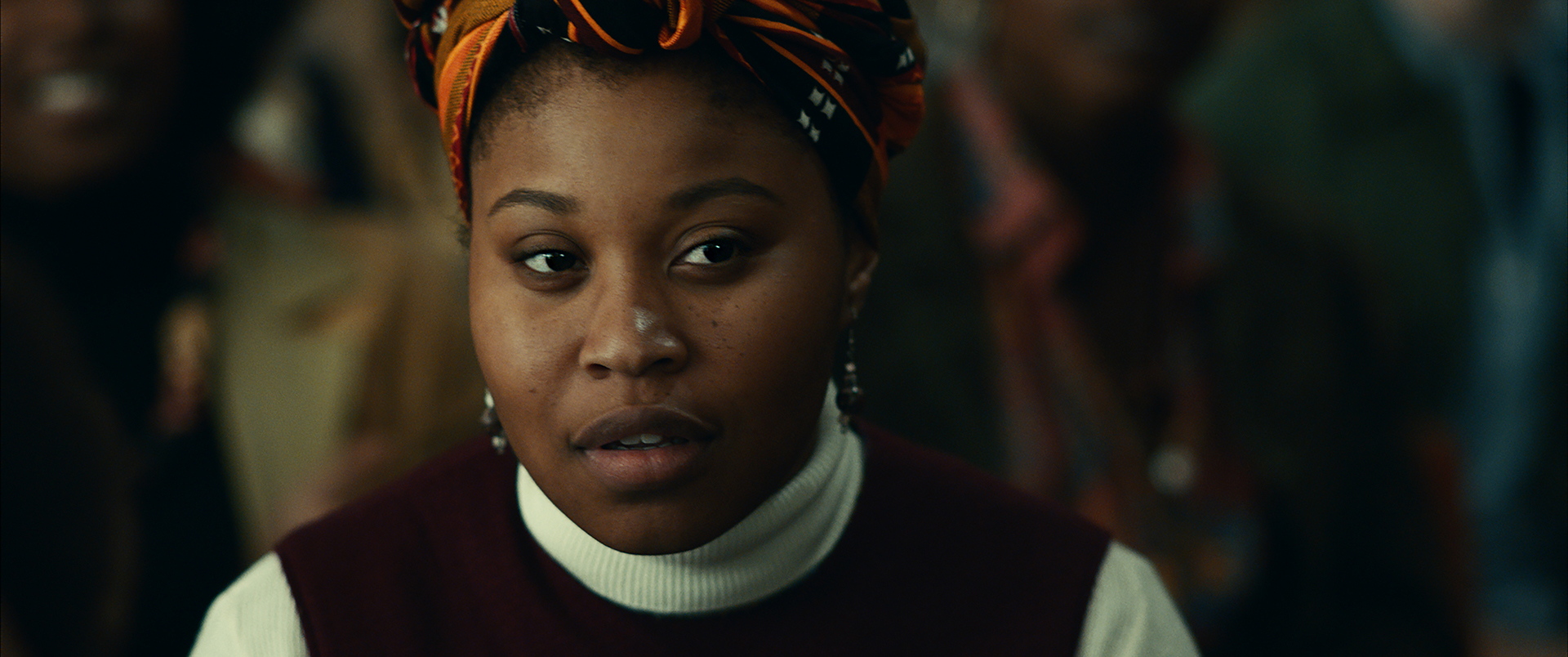
Outside of her work on Judas and promoting one of 2021’s most important and highly anticipated films, Fishback has plans that take her back to her spoken word roots. “I’m going to drop a little something,” she casually says. “My birthday is March 22nd; I’m going to be dropping a little something special on my birthday. Ever since I was a kid, I was doing spoken word poetry, and people used to always be like, ‘Oh, it sounds like rap.’ I’d just be like, ‘Nah, I don’t rap,’ but I’ve always wanted to do music. After Project Power came out, everybody… I can’t do a [Instagram] Live without people asking me to rap or do poetry, or am I going to do something. I think it’s a sign from the universe that I should stop dragging my feet and kind of do something. I’m going to do something in an interesting, more fun way. I’m not going to try to make it all or nothing. I’m just going to let it flow.” She’s also planning on releasing a book of poetry this year, while trying to figure out how to make something out of the video journals she’s been compiling.
When it comes to Fishback, her future is looking extremely bright. Standing across from Kaluuya and showcasing a number of her talents on screen in Judas is a huge look. Fishback is also varied in the projects she wants to tackle next, speaking on the Romeo and Juliet idea she has, as well as wanting to have an I Love Lucy-esque comedy show. There is one project that sounds right up her alley, playing to her strengths as a creative and her growing desire to expand.
“There’s a book called Children of Blood and Bone by Tomi Adeyemi,” Fishback explains. “It’s a fantastical piece about magic in Africa and women [with] powers. That’s what I want to do; I want to go into the fantastical world. I want to explore different genres and I want to do it in a way that’s profound.”
Judas and the Black Messiah hits theaters and HBO Max on Friday, Feb. 12. This conversation is a part of Complex’s Judas Week, a series of interviews featuring the cast and crew of Warner Bros.’ Judas and the Black Messiah, discussing one of 2021’s most anticipated films.

